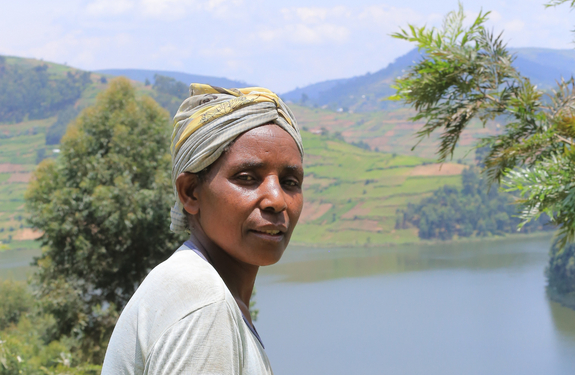Lake Bunyonyi is not just one of Uganda’s most beautiful natural sites, it’s also a vital water source for drinking and agriculture which millions of people depend on.
There are many challenges around maintaining the lake as an eco-system: encroachment of local communities into the wetlands and deforestation which is leading to soil erosion.
To promote conservation efforts, Self Help Africa’s project ‘Striking A Balance’ is training smallholder farmers on soil and water conservation methods such as digging trenches and check-dams and planting a variety of trees to stop soil and water run-off entering the lake and causing siltation.
Siltation is dirt, soil or sediment found in water. Too much of it causes a decrease in oxygen levels in water, affecting fish and other marine life.
To date, the project has overseen the digging of 42 trenches and the planting of 30,000 trees to counteract this.
To oversee these activities, Village Natural Resource Committees have been set up to help implement conservation plans. They have also set up Village Savings and Loans groups to support community members in adapting to a green economy. Self Help Africa boosted the groups with a conservation fund of 82 million Ugandan shillings.
“We thank Self Help Africa for helping us by ensuring the lake is protected and that there is no more siltation” says farmer, Christina Akankwasa.
The project has promoted alternative, environmentally-friendly livelihoods for farmers around lake Bunyonyi like beekeeping, crafts and mushroom-growing. “I make 500,000 Ugandan shillings from my harvest after three months” says Tumwesi Susan, one of 36 mushroom farmers in her group. Mushroom growing is becoming an increasingly popular alternative livelihood as it’s sustainable, quality seed is available and it has a high market value.
“Before, we lacked the skills to make anything other than simple items” explains craft-maker Tumwijukye Phionah. “The Self Help Africa programme trained us and gave us the skills to weave more and better quality crafts” she adds.
The project has shown that implementing simple and achievable measures can make a significant difference in striking a balance between conserving Lake Bunyonyi and earning a livelihood from its resources.

